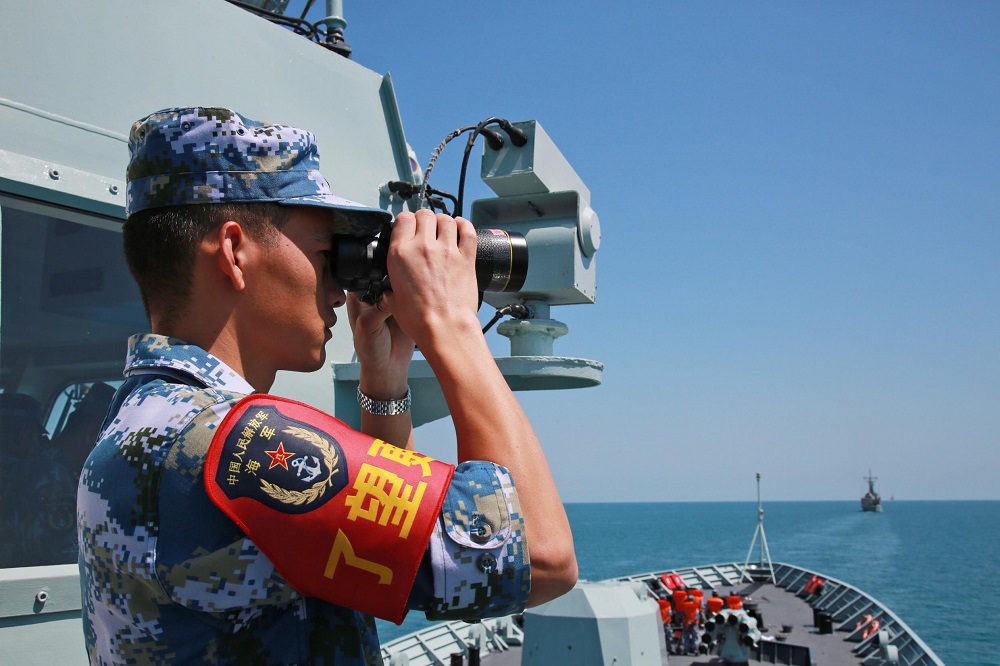Should China help secure the Strait of Hormuz?

US President Donald Trump’s recent tweet on the Strait of Hormuz, in which he said that Asian countries ‘should be protecting their own ships’ prompts some serious questions—setting aside some customary Trumpian bravado and factual inaccuracy.
Since the US is set to become a net energy exporter, and has moved decisively away from energy dependence on the Middle East, should China be encouraged to take up the slack as a maritime security provider in the Strait of Hormuz, through which one-fifth of the world’s petroleum is still shipped?
How likely is it that strategic tensions in the Persian Gulf could precipitate a naval changing of the guard there, if an overstretched US Navy willingly hands the baton to the number-one importer of seaborne oil through the strait—China—which already boasts a bigger fleet?
However outlandish this scenario appears, a potential Chinese naval role in the Gulf is worth considering on its strategic and geo-economic merits.
China is the largest importer through the bottleneck strait in absolute terms, but its dependence on oil imports through the Gulf is nothing like the 91% Trump claimed. China’s overall dependence on Gulf oil is closer to 44%.
For Japan and South Korea, their relative reliance on Gulf petroleum, at around 88% and 82%, respectively, is significantly higher. As US allies, Washington is bound to approach them first on naval burden-sharing in the Middle East. Surprisingly, given that a Japanese tanker was recently targeted, Tokyo has announced that it has no plans to send its naval vessels to the Strait of Hormuz, according to Japan’s defence minister. India sources around 63% of its oil from the Middle East, but was quick off the mark in deploying two warships to the Gulf.
China certainly possesses the means to contribute naval forces to buttress security for shipping in the Gulf. This would be a natural outgrowth of the People’s Liberation Army Navy’s involvement in counterpiracy in the Gulf of Aden since 2007. The PLAN has the surface forces available and ample operational experience at escort work. It has supporting infrastructure in place, given the relative proximity to the PLA base in Djibouti.
A regular deployment of PLAN frigates to the Strait of Hormuz is easy to argue for from the standpoint of China’s national interest, given its dependence on seaborne oil imports from the Gulf. It’s also consistent with the normative notion that blue water navies tend to contribute to the international public good once they acquire a self-interested stake in accessing the global maritime commons. As the PLAN acquires more multinational exposure and extraterritorial experience, so the argument goes, its behaviour and outlook will start to converge with that of other ocean-going navies.
If the public good argument appears overly hopeful to sceptics of Beijing’s global citizenship credentials, there’s a more Machiavellian rationale for mooting a PLAN presence in the Gulf. That is to say the sooner Beijing gets pulled into that stickiest of naval gyres, the better it will be for states that are currently facing China’s undivided strategic attention in the western Pacific.
Some will regard an open invitation for China’s navy to police the world’s most geopolitically important chokepoint as akin to inviting the fox into the chicken coop. Once confident in the role, Beijing could be tempted to use its naval power coercively and selectively to pressure its Asian neighbours, including Taiwan and Japan, which remain chronically dependent on Gulf oil. After all, Hormuz is a true chokepoint, unlike the Malacca strait.
On balance, China should be welcomed as a naval contributor to Gulf security. Yet that’s unlikely to happen for the foreseeable future, for three reasons.
First, China is likely to perceive any threat to its own shipping as a red herring in a strategic spat between Iran and the US, and by extension US allies. Beijing will focus instead on maintaining close political relations with Tehran, seeking private assurances that Chinese tankers will not be targeted. It has no desire to be drawn directly into a Gulf maritime security role that bears the additional risks of being pulled into proxy conflicts between Saudi Arabia and Iran. And who could blame it?
Second, apart from diplomatic ship visits, there’s little evidence to suggest that the PLAN has much operational interest in the Gulf. Its focus has been firmly on the Red Sea. Beijing will seek to continue free riding off other security providers in the Gulf for as long as possible.
Third, China’s Gulf oil dependence is not only proportionally much lower than that of Japan, Korea and India. China has also made conscious efforts to reduce its exposure to supply disruptions in the Gulf. It has already surged oil imports from Iran, before the expiry of US sanctions waivers.
More purposefully, China has built up a strategic oil reserve which may already exceed 500 million barrels. It has further maximised land-based sources, from Central Asia and Russia, currently China’s primary supplier (accounting for around 16% of its oil imports). Finally, if push really came to shove, China has the option to invest in coal-to-oil technology, ensuring that the PLA would never go short of fuel even under blockade conditions.
As that familiar gurgling sound of the Gulf sucking in naval assets reverberates in Delhi, Seoul, Tokyo and Canberra, my bet is Beijing will be content to sit this one out. Ironically, strategic competitors have the advantage on allies and partners when it comes to free riding.